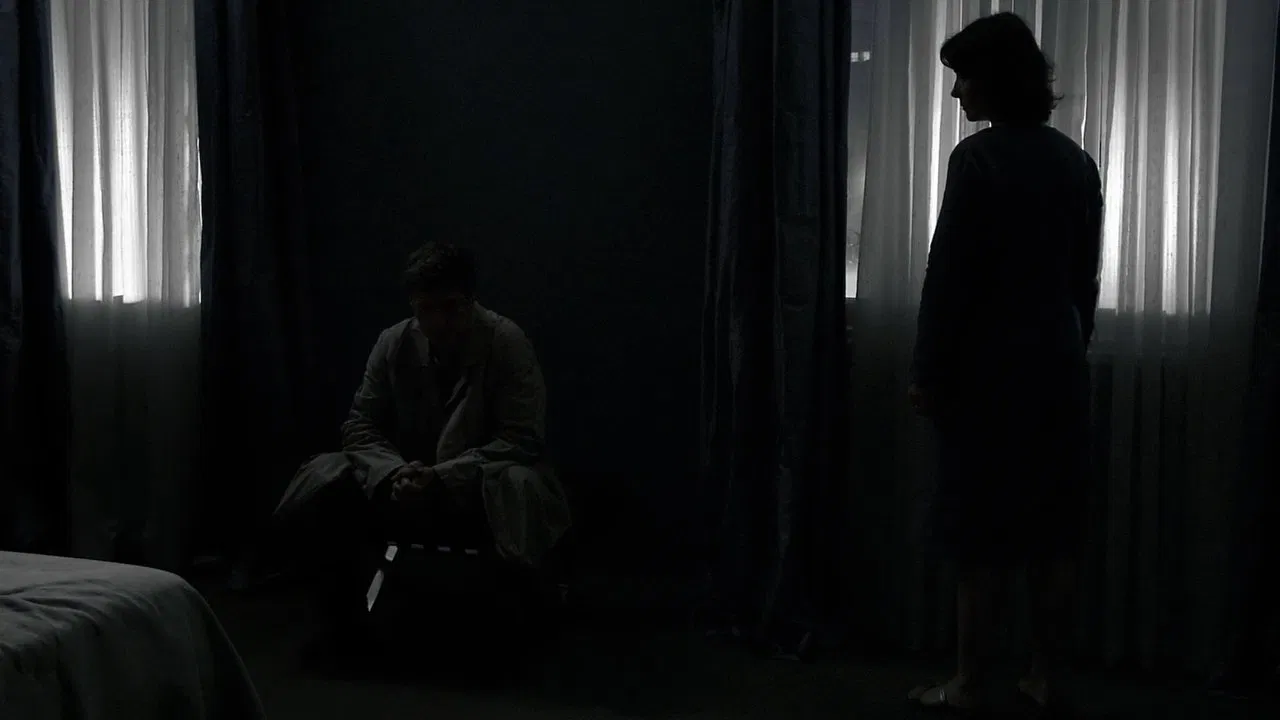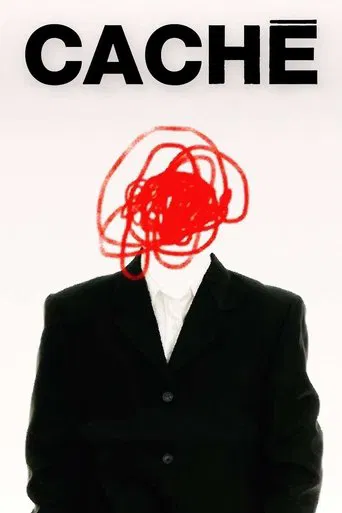

Not even close to a masterpiece as I was led to believe. Themes on guilt and trust does work with some excellent performances. But it seems to me that the director tries to inflict the collective guilt forcefully by using some scenes and dialogues rather than conveying through the natural flow of the film. It's especially visible because how rest of the film plays out and the scenes that's supposed to be shocking isn't as impact full as it could have been. The simple high definition digital cinematography (however good the staging is) and the dull pacing highlights the faults because of what this could have become. The status of the director and the forced messages seems to be the reason for the reception of this film in my view.
... View MoreRecently I've seen Cache, by Michael Haneke. (2005), and I must say that I was fascinated by this film. The scenery of the film is extremely simple and repetitive. The most interesting is in Haneke's way of positioning his camera, and the duration of his plans too. Not only does its staging allow the viewer to appreciate the dialogues between the characters at the maximum, but the editing constantly keeps the latter in suspense. Hidden is the story of Georges and Anne, a couple from the Parisian banner who is sent envelopes containing anonymous cassettes. The contents of the tapes are their own house filmed by an unknown person from Georges's childhood. The couple tries to find the identity of the person who sends the cassettes...but things get complicated. The scenery of the film may be very simple, but one notices the choice of filming in high definition. Normally, a film of the same format as Caché would be filmed in an old-school way, but it is interesting to see that high definition elevates the visual of the film to a higher level. Does this choice of image quality have anything to do with the narration? I don't think so but maybe Haneke had an idea. As is the case for many of the film sequences for that matter. Moreover, the level of violence in the movie is incredibly high. We see long sequences without any action, then without warning, we see the head of an animal to be cut free by the axe or a man to cut his throat. This inequality in the bloody sequences of the film is very interesting. The spectator is constantly thirsty to know who sends these tapes, and who also sends these macabre drawings. But Haneke reveals very little in the film, and that is precisely one of the interesting aspects of the plot. One is constantly absorbed by this type of narration which cleverly shows the psychological state of Georges throughout the film and the hell that he's going through. He sups a man who apparently had a past with him and the other does not know what he is talking about when he talks to him about the tapes. And this is all we know, Haneke gives free rein to any interpretation of the spectator and I believe that this was precisely his goal.
... View MoreLiberty, Equality, Fraternity. This is France's established, officially disseminated political memory. The Storming of the Bastille on the afternoon of 14 July 1789: this is the event and date that French citizens have etched in their collective memory.However, the date in France's repressed political memory, which is cited in Michael Haneke's Caché, is October 17, 1961. On this date, French police brutally quashed peaceful demonstrations of hundreds of Algerian protesters who had congregated in Paris to protest against a French security crackdown during the Algerian War of Independence. The official death toll the following day was two dead but this figure was disputed with reports of dozens of bodies found floating in the River Seine. (The figure cited in the film is 200 dead).Haneke's film cites this clash, which is a sore spot in Frances history and something that was hidden from France's political memory for decades. A public inquiry was prevented and access to archived police records relating to the event was not allowed until 1998.However, Caché is not a film explicitly about these events, they function in the narrative as a framework for the complex relationship of memory, forgetting, and guilt. Within the film's narrative, the Algerian character Majid's parents were killed in this massacre.The opening shot is immobile unwavering, unflinching, mechanical, objective. It is digital video footage: cheap, the medium of the masses. It is post-modern, it depicts the cold light of present day. One of the opening lines: "It doesn't look like it was filmed through a window". It is unvarnished and unedited (unlike the protagonist Georges' TV program and life). It is real. Nothing of note happens in the taped footage. The lead characters rewind the footage and watch again. A trick is revealed. We realize we are watching taped footage that the 'agents' of the scene are also watching. What are we ultimately watching? We are watching the watchers, the chattering classes of contemporary France; those who interpret and disseminate France's political memory. We are watching them manipulate history. Edit time. Rewind, fast-forward, cut, omit. (Editing an episode of his TV show later on, where he cuts back in: the woman on screen smiles and says "it's poetic license, no?").Georges hides from his wife, from his son, from his mother, from his friends. His wife Anne finally breaks down later in the film, pleading: "People talk to each other, don't they?"The mother, too, also keeps memories hidden. She claims to not be aware of whom Georges is referring to when he mentions Majid, despite the fact that this was a child she had planned to adopt. She has suppressed the memory: "It was a long time ago. And it's not a happy memory".The Euronews footage from Iraq (which appears at the golden section of the film) depicts events that may well be repressed in the political memory of certain European countries decades in the future. France (along with Haneke's homeland of Germany) famously refused to join the USA's 'coalition of the willing' in 2003 to invade Iraq. Caché can be seen as a riposte to French commentators who were suggesting at the time of filming that France had somehow taken the moral high ground. Wait, says Haneke, we have plenty of skeletons in our own closet.As the narrative scene plays out, neither actor is center of frame – it is the television screen, the news footage – now of conflict in Palestine - which is center. It is in the background and the foreground simultaneously. We try to ignore it to follow the narrative, but it is difficult. It refuses to be hidden. One recalls the intentional confusion between the director's camera and the video in the opening scene. The news footage references Italian and British forces. This is not simply a French film for French audiences. This is an international film for all nations. After Sajid completes his suicide, we see Georges has spent the following hours in the cinema. He has sought escape from the horrible reality in a dark room. Later he hides from his 'friends' in his darkened bedroom. Lastly, in his final scene, he closes all the curtains to block out the light."Do you expect me to apologize?" he asks Sajid's son towards the end of the film. (French president François Hollande would eventually apologize for the killings in 2012, seven years after this film was released).At the end of Caché, the protagonist lies down on his bed. A memory plays back in Georges' mind, one he has fought his entire life, since the age of six, to forget. It comes not as redemption but as a torturous thorn. Georges shows no remorse. There is no repentance or contrition. Thus, he will never know Liberty (he lives in a cage of lies of his own devise), Equality (apologies are offerings that disrupt the established hierarchies and, as a result, level out differences) nor Fraternity (his would-be adopted brother is dead).
... View MoreI tend to have an ambivalent reaction towards Michael Haneke. I admire his icy restraint, his minimalist aesthetics of slow camera movements and uncluttered frames, the elusive, subtly disquieting quality of his movies. However, while I wouldn't say he is preachy - his movies are far too cold and reptilian for that - his heavy-handed symbolism grates.As long as it focuses on a bourgeois family (Auteuil and Binoche) haunted by mysterious tapes delivered to their house, Caché is haunting and nightmarish, culminating in one of the most unsettling scenes recently committed to screen - a gruesome suicide, all the more terrifying for its suddenness in an otherwise bloodless movie.When it attempts to draw a parallel and moral connection between the Algerian War and a troubled relationship between children, on the other hand, Caché stammers: of all the ways to explore guilt and sins of the fathers, this feels clunky and out of its depth. La Battaglia di Algeri it ain't.6/10
... View More